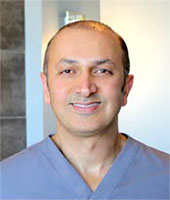If you are in a car accident, it is likely to involve injuries to your mouth that would require our expertise to heal and restore to health.
Sudden crashes often result in the head of the driver and anyone in the front passenger seat hitting the steering wheel or the dashboard. Airbags don’t always stop these injuries for a variety of reasons. The most common result is chipped teeth, for which dental bonding or veneers would provide the remedy. Our veneers are made of a strong cosmetic porcelain that can last for 10-15 years with proper care.
Cracked Teeth
The second most common injury from an auto accident is cracked teeth and a dental crown can hold them together and protect from further damage any tooth that has been cracked or fractured.
If teeth are knocked out in the accident or so severely damaged that they need to be extracted, dental implants are the ideal replacement. An implant consists of a biocompatible metal screw that is inserted into the jawbone and attached to a crown that looks exactly like a natural tooth. This can be a permanent solution.
If teeth are missing for any reason, they always need to be replaced because otherwise the mouth goes through a process of causing neighboring teeth to lean towards the gap, causing them and other teeth to become loose and they may eventually fall out. Alternatively, a dental bridge, which attaches an artificial tooth to neighboring teeth, could slow down this process.
iTero Restorations
Crowns and implants can be made using our in-office iTero, which produces a highly-accurate 3-D digital image of the inside of your mouth, allowing Dr. Louie to plan the process, speed instructions to a dental lab, and make sure the results are an exact match to your natural teeth.
Another common injury from accidents is TMJ Disorder (short for the displacement of the temporomandibular joint, the hinges that connect the lower jaw to the upper). You can feel them by holding your fingers just in front of your earlobes when you open and close your mouth and if they are displaced, they will make a popping or clicking sound when you do this. Or you may have trouble opening your mouth at all, feel pain in the hinges, soreness on the sides of your face, experience headaches, and neck or shoulder discomfort.
A customized orthotic splint is an oral appliance you can wear to get the jaw back in its proper place. Your bite can also be improved using crowns, bridges, implants, or Invisalign trays to prevent TMJD. We can also show you neuromuscular exercises to help and prescribe anti-inflammatories or muscle relaxers.
If you are in a car accident, call us as soon as possible for a full dental exam to discuss how Dr. Louie can help you recover.
